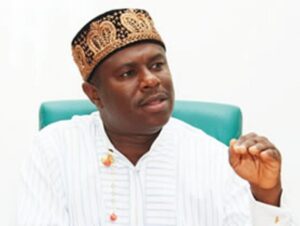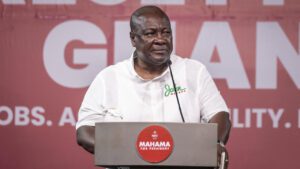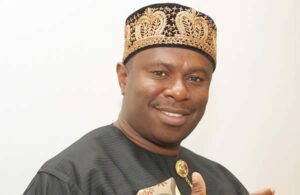Just before the elections
By Dakuku Peterside .
It is now a cliché that this election is a make-or-mar election for Nigeria. It is our way of saying this is a consequential election. The importance of this election has dawned on everyone, and unlike every other election before it, it is the first election post military era that the result is difficult to predict. There is a multiplicity of struggles between some simple and binary issues and some multifaceted issues. Some Nigerians are pitching this election as a contest between established orthodoxy since the current democratic dispensation in 1999 and the clamour for a new political order . Some are neither interested in any old nor new political order but want a political order that will solve the challenge of insecurity, poverty, unemployment and underemployment, and improve economic and social well-being .
This group seems more result-oriented and endlessly analyses the presidential candidates to determine who is more likely to tackle the hydra- headed problems facing Nigeria, irrespective of whether he is of the orthodoxy or the new political order group.
Unfortunately, because our electorate is still largely illiterate, some are transactional and mercantile about this election. For this group, this election is about buying and selling votes and maximising the total commercial value possible in the voting value chain in Nigeria. Against the background of Naira redesign policy or according to Progressive Governors, “Naira confiscation policy”,the contest of supremacy on this issue has shifted to the public space and Supreme Court . More fundamental is the fact that it is on the background of excruciating economic challenge that Nigerians will be making a choice in less than five days.
About 74.72 million Nigerians who had collected their Permanent Voters’ Card (PVC), or 80 per cent of 93.4 million registered voters, will on Saturday, 25th February head to the polling booths in what promises to be a pivotal moment for Nigeria. Elections will be held for National Assembly seats and the presidency, but all eyes are on the presidential ballot for good reasons. Whoever emerges victorious would have severe implications for the country’s future and Africa. Many people must have made up their minds about whom to vote for. They must have made this important decision based on numerous factors, some logical and noble, others primordial and sentimental and may be superstitious ignorance .This notwithstanding, performing the civic task of voting is essential to keep our democracy going. Nigerians are quite optimistic that this will be a comparatively free and fair election because of what INEC has put in place . We hope, too, that the best presidential candidate wins the election. However, what should be the priorities of the average voter as we go to the polls to elect the president?
Nigeria has not had the best leadership, which impacts the country’s fragile state and citizens’ economic life. The Nigerian problem, at best, can be reduced to a leadership problem. The quality of leadership a country gets directly correlates with the quality of leaders it has. Leaders who selflessly serve the interest of their people, leading the country to a clearly defined vision that is tangible, measurable and specific. Nigeria needs a leader that will lay the foundation for harnessing the vast potential of Nigeria and push it to be among the top 10 economies in the world within the next few decades. A leader that stops our sliding into the abyss and reverses the trend to growth and prosperity that will improve the lives of every Nigerian. A leader of the people, voted by the people and is for the people. We need this leader, and we need it now!
The first priority of the average voter is to identify who among the contending presidential candidates truly represent such a leader. Using their knowledge of each presidential candidate’s antecedents and prior experiences in leadership, voters can judge whom this presidential candidate is and vote for him based on their conscience.
The second priority of the average voter is to identify and vote for a presidential candidate capable of addressing the most critical challenges confronting Nigeria as a nation. A significant challenge for voters is identifying a leader powered by vision and purpose. Nigeria seems directionless, and every effort made by existing and subsequent governments yielded less-than-expected results at best and negative impacts at worst. We need a leader that will define what kind of future our country will have. A leader that will provide clear direction for the country and galvanise everyone to share and work for that future. The question is who, not which party, can best guarantee the future we deserve. Therefore, before casting your vote, you must be sure that the candidate can envision a future for the country, that his vision of the future aligns with yours, and that he can start the country on the road to that great future. The questions every voter must consider are: what kind of future do I want for Nigeria? Does this align with that of the presidential candidate I want to vote for? Does the candidate have the qualities, character, knowledge, skills and experience to fulfil this dream? Your answer to these questions will guide you towards the right choice.
The third crucial challenge for the presidential candidate is having the capacity to address the problem of disunity and lingering agitations of marginalisation and distrust among the various groups making up Nigeria. The candidate to vote for must be able to promote and strengthen our unity and nationhood. Presently, this election poses the most severe test of the unity of Nigeria. For the first time in this post-1999 democratic experiment, we have three major contenders for the presidency position, representing the three major ethnic groups and two major religious groups in Nigeria. Only a free, fair and credible election on Saturday will lay the foundation to douse the emotional sentimentalism that may ensue after the polls. The critical question is, who among the candidates can promote and strengthen our seemingly fragile unity? Who among them is a true Nigerian that will carry everyone along and challenge the pervading feelings of superiority or marginalisation by groups or sections of the country? The answer to this question is vital for voters to choose and vote for the next president.
The fourth challenge is for the candidate to have the clarity of vision and proven capacity to address intractable insecurity, massive unemployment, fantastical corruption, and devastating multidimensional poverty. These challenges have been the bane of Nigeria since independence, and it seems to be getting worse by the day. A content analysis of the electoral promises of Nigerian leaders from independence until now reveals that these problems have been there all this while. Political leaders in different shades, regimes, and dispensations have promised to eradicate these ills but failed woefully. We need a leader that will surmount these seemingly insurmountable problems. Only then shall we make progress. We need a leader who understands the link between economic security and social security – one cannot exist without the other. Therefore, we need a leader who will improve our economy through good infrastructure, sound economic policies, a business-friendly environment, high productivity, and a stable, moral, and ethical social and judicial system that drives national progress. A voter must ask: who among the candidates can tackle, most radically and definitively, the four issues of insecurity, unemployment, corruption, and poverty?
This election is the most technology based in Nigeria’s history. The need to deviate from the electoral malpractices of the past has led Nigeria to adopt the most modern electoral technology used in an election in democracies in the world. This is the first time in a presidential election in Nigeria that the BVAS and online transmission of result technology is adopted, and this has increased people’s hope for a transparent election with the future looking bright for credible elections. This hope has led many voters to believe their votes will count and therefore have power. This will likely lead to a high turnout for voting on Saturday. The body language and rhetoric of the president show that he is eager to leave a legacy of electoral transparency before he leaves office. This, too, is fuelling a quest for ownership of PVC and using it to vote in elections. It is noteworthy, too, that the president is championing moves to truncate any chances of buying the presidency and monetising the electoral process through vote buying or financial inducement to the INEC officials. This election, hopefully, will live up to its bidding of being the most accessible and fair election in Nigerian general election history.
The international community expects a credible, free, and fair election. As one of the biggest democracies in the world, the outcome of Nigerian elections reverberates worldwide. A successful election in Nigeria will strengthen democracy in subsaharan Africa and serve as counterforce to the growing appetite for coups and unconstitutional means of changing government in the region. A crisis in Nigeria would have far reaching migration and refugee implications for the entire continent of Africa. We need credible and peaceful elections more than ever at these perilous times when global politics and alignments are shaky, especially given NATO – Russia, brouhaha.
As voters perform their civic responsibility on Saturday, it is an opportunity to choose between different options, not only candidates but also what they represent versus what we want. It should not be about religion, region, ethnicity, and party but about the future of our country. The next president must have the capacity and character to change Nigeria for good. Your vote counts! Vote by vote, and election by election, we will rebuild Nigeria into the country of our dreams.




